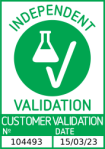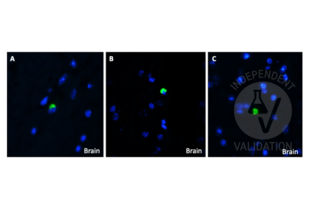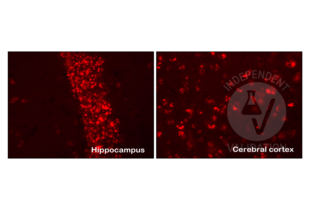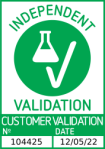beta Amyloid anticorps (C-Term)
-
- Antigène Voir toutes beta Amyloid (Abeta) Anticorps
- beta Amyloid (Abeta) (Amyloid beta (Abeta))
-
Épitope
- C-Term
-
Reactivité
- Humain, Souris, Rat
-
Hôte
- Souris
-
Clonalité
- Monoclonal
-
Conjugué
- Cet anticorp beta Amyloid est non-conjugé
-
Application
- Western Blotting (WB), ELISA, Immunofluorescence (IF)
- Specificité
- A-beta 1-40, A-beta 1-42, A-beta 1-43 and APP
- Réactivité croisée (Details)
- Human, mouse, rat (other species not tested)
- Purification
- Protein G affinity purification
- Immunogène
- Synthetic peptide derived from Human Abeta 1-42 protein
- Clone
- 9E8-1A3
- Isotype
- IgG1
-
-
- Indications d'application
- ELISA: 1:40,000, WB: 1:4,000, IF: 1:2,000
- Restrictions
- For Research Use only
-
- by
- Prof. Merighi, Laboratory of Neurobiology, Department of Veterinary Sciences, University of Turin
- No.
- #104425
- Date
- 12.05.2022
- Antigène
- beta Amyloid
- Numéro du lot
- 190522A
- Application validée
- Immunohistochemistry
- Contrôle positif
Adult (24 months) mouse brain
3-month-old Taconic mouse Model 1349 brain fixed in 4% paraformaldehyde
- Contrôle négative
We incubated slices overnight with the blocking solution only and then processed them with the secondary antibody.
- Conclusion
The beta amyloid antibody (Amyloid beta) (C-Term) ABIN5508784 works in IHC-P, especially at higher concentrations (1:200 and 1:500), and without the use of any antigen retrieval treatment.
- Anticorps primaire
- ABIN5508784
- Anticorps secondaire
- goat anti-rabbit AF488-conjugated antibody (Invitrogen by Thermo Fisher Scientific, A11034, lot 1971418)
- Full Protocol
- Perfuse mice with paraformaldehyde 4% in 0.1 M phosphate buffer pH 7.4 and post-fix in the same fixative for an additional 2 h at RT.
- Wash, dehydrate, and embed samples in paraffin wax.
- Wash several times with 0.01 M PBS.
- Cut intestines and brain with a microtome into 6µm sections and mount on glass slides.
- After paraffin removal, incubate sections for 1 h at RT in PBS containing 1% albumin from chicken egg white (Sigma, A5378) and 0.3% Triton-X-100 (BioRad, 161-0407, lot 00583) to block non-specific binding sites.
- Incubate sections with primary anti-beta amyloid (C-Term) (antibodies Online, ABIN5508784, lot 190522A) diluted 1:200, 1:500, 1:1000, and 1:2000 in PBS-BSA-PLL ON at RT.
- Wash sections 3x 5 min with 0.01 M PBS.
- Incubate sections with secondary goat anti-rabbit AF488-conjugated antibody (Invitrogen by Thermo Fisher Scientific, A11034, lot 1971418) diluted 1:500 in 0.1 M PBS for 1 h at RT.
- Wash sections 3x 5 min with 0.01M PBS.
- Mount specimens in Fluoroshield (Sigma, F6182, lot MKCB0153V).
- Acquire images with a fluorescence microscope and appropriate filter settings for AF488, e.g. Leica DM 6000B fluorescence microscope equipped with a digital camera at 40x magnification.
- Notes
Antigen retrieval treatment was also tested. In this case, sections were processed for microwave antigen retrieval for 10 min(95-100 °C) in 10 mM sodium citrate buffer (pH 6.0). After 20 min of spontaneous cooling, sections were washed twice for 5 min with distilled water and for 5 min with PBS.
Validation #104425 (Immunohistochemistry)![Testé avec succès 'Independent Validation' signe]()
![Testé avec succès 'Independent Validation' signe]() Validation ImagesProtocole
Validation ImagesProtocole - by
- Prof. Merighi, Laboratory of Neurobiology, Department of Veterinary Sciences, University of Turin
- No.
- #104493
- Date
- 15.03.2023
- Antigène
- Abeta
- Numéro du lot
- 190522A
- Application validée
- Immunohistochemistry
- Contrôle positif
3-month-old Taconic mouse Model 1349 brain fixed in 4% paraformaldehyde
- Contrôle négative
One control slice for each experimental procedure processed omitting the primary antibody; overnight incubation in diluent solution only.
- Conclusion
The beta Amyloid antibody (Amyloid beta) (C-Term) ABIN5508784 works in IHC-P, especially at higher concentrations (1:200 and 1:500). Tyramide amplification strongly enhances the positive signal.
- Anticorps primaire
- ABIN5508784
- Anticorps secondaire
- poly-HRP conjugated goat anti-rabbit antibody
- Full Protocol
- Perfuse mice with paraformaldehyde 4% in 0.1 M phosphate buffer pH 7.4 and post-fix in the same fixative for an additional 2 h at RT.
- Wash, dehydrate, and embed samples in paraffin wax.
- Wash several times with 0.01 M PBS.
- Cut intestines and brain with a microtome into 6 µm sections and mount on glass slides.
- After paraffin removal, incubate sections for 1 h at RT in PBS containing 1% albumin from chicken egg white (Sigma, A5378) and 0.3% Triton-X-100 (BioRad, 161-0407, lot 00583) to block non-specific binding sites.
- Incubate sections with primary anti-beta amyloid (N-Term) (antibodies-online, ABIN5508784, lot 190522A) diluted 1:200, 1:500, 1:1000, and 1:2000 in 0.1 M PBS-BSA-PLL ON at RT.
- Wash sections 3x 5 min with 0.01 M PBS.
- Incubate sections with poly-HRP conjugated goat anti-rabbit antibody for 1 h at RT.
- Wash sections 3x 5 min with 0.01 M PBS.
- Incubate sections Tyramide working solution (for 5 sections: 100X Tyramide stock solution 5 μL, 100X H2O2 solution 5 μL, and 1X Reaction buffer 500 μL; Thermo Fisher Scientific, B40915, lot 2086865) for 10 min.
- Stop the reaction with the Reaction Stop Reagent working solution.
- Wash sections 3x 5 min with 0.01M PBS.
- Mount specimens in Fluoroshield (Sigma, F6182, lot MKCB0153V).
- Acquire images with a fluorescence microscope and appropriate filter settings for AF488, e.g. Leica DM 6000B fluorescence microscope equipped with a digital camera at 40x magnification.
- Notes
-
- Format
- Liquid
- Concentration
- 1 mg/mL
- Buffer
- PBS, pH 7.4
- Agent conservateur
- Without preservative
- Conseil sur la manipulation
- Avoid freezing/thaw cycles.
- Stock
- -20 °C
- Stockage commentaire
- Store at -20°C to -80°C.
-
-
: "ImmunoPEGliposome-mediated reduction of blood and brain amyloid levels in a mouse model of Alzheimer's disease is restricted to aged animals." dans: Biomaterials, Vol. 112, pp. 141-152, (2016) (PubMed).
: "Anti-Aβ-MAb and dually decorated nanoliposomes: effect of Aβ1-42 peptides on interaction with hCMEC/D3 cells." dans: European journal of pharmaceutics and biopharmaceutics : official journal of Arbeitsgemeinschaft für Pharmazeutische Verfahrenstechnik e.V, Vol. 81, Issue 1, pp. 49-56, (2012) (PubMed).
: "Versatile and efficient targeting using a single nanoparticulate platform: application to cancer and Alzheimer's disease." dans: ACS nano, Vol. 6, Issue 7, pp. 5866-79, (2012) (PubMed).
: "The binding affinity of anti-Aβ1-42 MAb-decorated nanoliposomes to Aβ1-42 peptides in vitro and to amyloid deposits in post-mortem tissue." dans: Biomaterials, Vol. 32, Issue 23, pp. 5489-97, (2011) (PubMed).
-
: "ImmunoPEGliposome-mediated reduction of blood and brain amyloid levels in a mouse model of Alzheimer's disease is restricted to aged animals." dans: Biomaterials, Vol. 112, pp. 141-152, (2016) (PubMed).
-
- Antigène
- beta Amyloid (Abeta) (Amyloid beta (Abeta))
- Autre désignation
- Amyloid beta (Abeta Produits)
- Sujet
- Amyloid beta (Aβ or Abeta) is a peptide of 36 - 43 amino acids derived from the cleavage of APP (Amyloid Precursor Protein) by β- and γ-secretases. It is involved in Alzheimer´s disease, among other severe neurological disorders. It has been proved that the Aβ could be a crucial target for these important diseases treatment.
- Pathways
- Inflammasome
-





 (4 références)
(4 références) (2 validations)
(2 validations)



